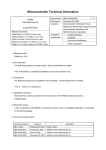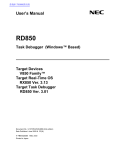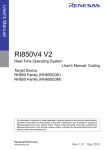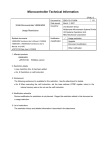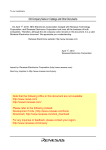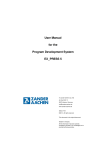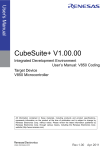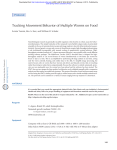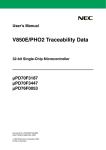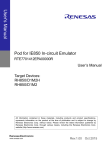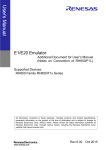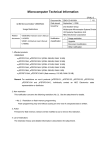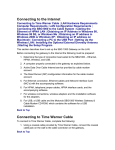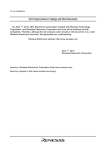Download V850 Real-Time OS RX850 Pro
Transcript
Microcontroller Technical Information
RX850 Pro
V850 Real-Time OS
Document No.
ZMT-F35-10-0012
Date issued
March 30, 2011
Issued by
MCU Tool Product Marketing Department
MCU Software Division
MCU Business Unit
Renesas Electronics Corporation
Usage Restrictions
Related documents
None
Notification
classification
√
1/2
Usage restriction
Upgrade
Document modification
Other notification
1. Affected product
RX850 Pro Ver. 3.30 package (kernel RX850 Pro Ver. 3.21) and earlier versions
2. New restrictions
The following restriction related to the kernel has been added:
• No. 17 A cyclic handler might start up earlier than the specified cycle time.
3. Workarounds
The following workaround is available for the above restriction. See attachment 1 for details.
• No. 17 Do one of the following:
• Do not allow an interrupt handler to issue the system call act_cyc for a cyclic handler
when TCYC_ON has been specified.
• Design the system so that only two cyclic handlers can be waiting to be started up at one
time.
4. Modification schedule
• No. 17
This will not be corrected, so regard it as a specification.
5. List of restrictions
A list of restrictions in the RX850 Pro, including the revision history and detailed information, is
described in the attachment.
ZMT-F35-10-0012
1/2
6. Document revision history
RX850 Pro V850 Real-Time OS - Usage Restrictions
Document Number
Issued on
Description
SBG-T-2494
September 28, 2001
1st edition
SBG-TT-0007
November 2, 2001
Addition of new kernel restriction (No. 8)
SBG-TT-0096
May 9, 2002
Addition of new kernel restriction (No. 9)
ZBG-CD-05-0018
February 24, 2005
Addition of new kernel restriction (No. 10)
ZBG-CD-05-0027
March 31, 2005
Addition of new kernel restrictions (No. 11 and No. 12)
ZBG-CD-05-0035
May 27, 2005
Addition of new kernel restrictions (No. 13 and No. 14)
Modification of figures in No. 11 in accordance with figures in No. 13
ZBG-CD-05-0057
June 13, 2005
Addition of description of kernel restriction (No. 13)
ZBG-CD-05-0068
July 20, 2005
Modification of description of kernel restriction (No. 11)
Deletion of description of kernel restriction (No. 13)
ZBG-CD-06-0024
April 24, 2006
Modification of description of kernel restriction (No. 11)
Addition of new kernel restrictions (No. 15 and No. 16)
ZBG-CD-09-0034
June 18, 2009
Addition of new CubeSuite-related restriction (No. 1)
ZMT-F35-10-0012
March 30, 2011
Addition of new kernel restriction (No. 17)
ZMT-F35-10-0012
Attachment 1 - 1/12
Restrictions Related to RX850 Pro Kernel
1. Product History
No.
Usage Restrictions
Kernel Version
3.11
3.13
3.15
3.20
3.21
√
√
√
√
1
Using chg_icr() and ref_icr() with V850E core
√
2
Size estimation for pool 0 in CF definition file
√
3
act_cyc system call issuance
√
4
Interrupt handler restoration
√
√
5
Trace handler registration for AZ850
√
√
6
Interrupt handler stack size specification during configuration
√
√
7
System call del_mpl
√
√
8
The program inadvertently loops at system call issuance when
√
√
the RX850 Pro and user application are allocated to
independent load modules.
9
√
√
√
√
√
√
√
√
√
√
√
√
The AZ850 trace result is invalid if a static error is generated by
a system call when using the AZ850 to analyze a module that
uses the RX850 Pro.
10
Interrupts cannot be executed after the r19 register value is
√
replaced by certain values in an initialization handler.
11
The operation becomes undefined if a clock interrupt is
acknowledged during cyclic handler processing.
12
The operation becomes undefined if an attempt is made to
wake up a task that does not exist when returning from an
interrupt handler.
−
13
14
The operation becomes undefined when using system call
tget_blk.
15
√
If multiple clock interrupts are acknowledged, interrupts might
no longer be acknowledged.
16
Access using the ep register might be invalid depending on the
√
√
√
√
√
√
√
√
option specified with a GHS compiler.
17
A cyclic handler might start up earlier than the specified cycle
√
time.
√: Applicable
ZMT-F35-10-0012
Attachment 1 - 2/12
2. Restriction Details
No. 1
Using chg_icr() and ref_icr() with V850E core
Description:
System calls chg_icr() and ref_icr() which access the interrupt control registers, might not
work as expected when using the RX850 Pro on the V850E core.
Cause:
The RX850 Pro determines the address of an interrupt control register from the interrupt source
number. However, the relationship between the interrupt control register addresses and interrupt
source numbers in the V850E core is different from the rest of the V850 microcontroller, so the
correct address cannot be obtained.
Workaround:
Control the interrupt control registers directly rather than using these system calls.
Correction:
This will not be corrected, so regard it as a specification.
No. 2
Size estimation for pool 0 in CF definition file
Description:
The interrupt factor conversion table will be damaged if memory pool 0 (SPOL0) is specified with a
CF definition file as the exact size indicated in Installation User’s Manual. Thus, an abnormality might
occur in control of the interrupt handler. In addition, memory data might be damaged as a result of
operation of an incorrect interrupt control register.
Cause:
This occurs because the cf850pro generates an invalid address as memory pool 0 used by the OS
when specifying the size of memory pool 0 as the exact value based on the formula in Installation
User’s Manual. The RX850 Pro did not perform processing when the size of memory pool 0
excluding the resource management table was 0.
Workaround:
Specify the size of memory pool 0 to the exact size indicated plus 0x10 bytes.
Correction:
This issue has been corrected in Ver. 3.13.
ZMT-F35-10-0012
No. 3
Attachment 1 - 3/12
act_cyc system call issuance
Description:
If the act_cyc system call is issued from an interrupt immediately before execution of a cyclic
handler, the activation of the cyclic handler is inadvertently cancelled.
Cause:
In the RX850 Pro, in the time between the elapse of the cyclic handler’s activation time and when the
cyclic handler is actually activated (while a timer handler is being executed), a flag is set in the cyclic
handler’s management structure indicating the ready state, and the cyclic handler is held waiting. In
Ver. 3.11, if an interrupt is generated while this flag is set and the act_cyc system call is issued
from the interrupt handler to the corresponding cyclic handler, this flag might be inadvertently cleared,
causing the activation of the cyclic handler to be cancelled.
Workaround:
There is no workaround.
Correction:
This issue has been corrected in Ver. 3.13.
No. 4
Interrupt handler restoration
Description:
When ret_wup or equivalent processing is performed after an interrupt is generated and the
interrupt handler operation is terminated, the gp and ep register values might not be restored. Note
that this only occurs when the task ID woken up by ret_wup is invalid.
Cause:
Checking for errors in ret_wup is performed during task wake-up processing. If there is an error, the
wake-up processing is skipped and resume processing from the interrupt handler is performed.
However, if a task ID number range check error (E_OACV, E_ID) is detected, the processing
sequence will change and the resume operation from the handler is performed without restoring the
gp and ep register values.
Workaround:
• Disregard this error and execute the processing because the task ID number error is a static error.
• Do not use the ret_wup system call. Use the wup_tsk and ret_wup system calls in combination
instead.
Correction:
This issue has been corrected in Ver. 3.15.
ZMT-F35-10-0012
No. 5
Attachment 1 - 4/12
Trace handler registration for AZ850
Description:
This restriction applies only when the RX850 Pro (.system section) and trace handler (.text) are
allocated to independent load modules. In this case, even when the RX850 Pro calls the AZ850 trace
handler registration routine, the tp register value is not switched. As a result, the trace handler is not
registered correctly.
Cause:
The AZ850 trace handler registration routine is called by processing from the symbol __az_defhdr
at the initialization of the RX850 Pro. This file exists in trcent.o (.text section) under
librx85p.a. If this file is allocated in a load module that does not perform RX850 Pro’s processing
(in this case, if the file is allocated in the .system section by start.o, which initializes the RX850
Pro), the tp register is not switched when the operation jumps to __az_defhdr, causing an error.
Workaround:
An invalid address is called due to this behavior, causing a program loop at system startup (when the
initial task starts up). Therefore, if the program loop does not occur, it can be judged that this
restriction does not apply. When this behavior occurs, implement one of the following workarounds:
• Replace the AZ850 trace handler (trcent.o) with the corrected one (temporary workaround).
• Do not separate the RX850 Pro and trace handler into independent load modules.
Correction:
This issue has been corrected in Ver. 3.15.
No. 6
Interrupt handler stack size specification during configuration
Description:
The interrupt handler stack size must be specified in the configuration file, but even though 0x0 is
specified, no error is output by the configurator (cf850pro).
Cause:
This is a judgment error inside the configurator (cf850pro).
From Ver. 3.15, the size can be specified in a range from 0x100 to 0x7ffffffc. If a value in a range
from 0x0 to 0xff is specified, an error message E2208: System stack size out of range is
output. For details about the interrupt stack capacity, see 5.4 CAPACITY OF STACK FOR
INTERRUPT HANDLER in Installation User’s Manual.
Workaround:
Do not specify a value less than 0x100.
Correction:
This issue has been corrected in Ver. 3.15.
ZMT-F35-10-0012
No. 7
Attachment 1 - 5/12
System call del_mpl
Description:
When deleting a memory pool using the system call del_mpl, if the operation is performed in a state
in which a memory block has been acquired from the target memory pool using the system call
get_blk, pget_blk, or tget_blk, the memory area might not be released correctly.
If this occurs, the remaining capacity of the user memory is managed as being smaller than the
actual capacity. If deletion and creation of a memory pool is repeatedly performed, therefore, no
more memory pools can be created using the system call cre_mpl, causing an abnormal
termination (E_NOMEM).
Cause:
When deleting a memory pool while a memory block is acquired, the acquired memory block should
be released by the RX850 Pro. At this time, however, the memory block management size is not
updated, causing this behavior.
Note, however, that this restriction does not apply when all the memory blocks are released by the
system call rel_blk before a memory pool is deleted using the system call del_mpl.
Workaround:
Release all the memory blocks acquired from the target memory pool before deleting a memory pool.
Correction:
This issue has been corrected in Ver. 3.15.
No. 8
The program inadvertently loops at system call issuance when the RX850 Pro and user
application are allocated to independent load modules.
Description:
The program might inadvertently loop at system call issuance if a user application (e.g. .text) is
modified when the RX850 Pro and user application are allocated to independent load modules, or
when the RX850 Pro is ROMized and its address is fixed.
This occurs when either of the following conditions (1) and (2) or (1) and (3) are satisfied at the same
time.
(1) Renesas Electronics’ compiler CA850 is used.
(2) The RX850 Pro (.system, .system_int, or .system_cmn section) and user application
(e.g. .text) are allocated to independent load modules, and the tp (text pointer) values in the
RX850 Pro and user application differ.
(3) The user application is modified after the RX850 Pro is ROMized and its address is fixed, and
consequently, the tp value of the user application is changed.
Cause:
When a system call is issued, the AZ850 trace handler routine is executed. At this time, the location
where the tp value of the RX850 Pro is used is found at the location where the tp value of the user
application should be used. As a result, the program inadvertently loops because the correct address
cannot be obtained from the system call table information at system call issuance when
• the RX850 Pro and user application are allocated to independent load modules, and the tp
values in the RX850 Pro and user application differ
or
ZMT-F35-10-0012
Attachment 1 - 6/12
• the user application is modified after the RX850 Pro is ROMized and its address is fixed, and
consequently the tp value of the user application is changed.
Workaround:
When this occurs, the program inadvertently loops when a system call is issued because an invalid
address is called. In other words, if the system call is executed normally, it can be judged that this
restriction does not apply. More precisely, the tp value code of the RX850 Pro (.system) and that
of the user application (e.g. .text) are compared. If they are the same value, it can be judged that
this restriction does not apply. Implement either of the following workarounds if this restriction applies.
• Replace the AZ850 trace handler (trcent.o) with the corrected one (temporary workaround).
• Do not separate the RX850 Pro and trace handler into independent load modules.
• Specify the previous tp value as tp and link it to the link directive file (address specification)
when this behavior occurs due to program modification after ROMization of the RX850 Pro.
Correction:
This issue has been corrected in Ver. 3.15.
No. 9
The AZ850 trace result is invalid if a static error is generated by a system call when using the
AZ850 to analyze a module that uses the RX850 Pro.
Description:
The AZ850 cannot create correct trace data if a static error that is detected inside the interface library
preceding system call processing occurs as a result of system call issuance by the RX850 Pro.
The static error is one of the system call errors that does not occur during normal operation, and that
has a return value of E_ID (specified ID number is invalid) or E_PAR (parameter specification is
invalid), etc. This error indicates the return value marked with an asterisk (*) in the explanation of the
return value under the explanation of the system call in the RX850 Pro Fundamental User’s Manual.
Cause:
The AZ850 malfunctions because an invalid parameter is passed from the RX850 Pro to the AZ850
when a static error occurs.
Workaround:
The correct trace result can be obtained by clearing the static error of the system call before using
the AZ850. If it is necessary to obtain the correct trace result even when a static error occurs, RX850
Pro Ver. 3.16, in which this restriction is corrected, must be used. In such a case, Renesas
Electronics will provide separate support as a temporary measure.
Correction:
This issue has been corrected in Ver. 3.20.
ZMT-F35-10-0012
Attachment 1 - 7/12
No. 10 Interrupts cannot be executed after the r19 register values are replaced by certain values in an
initialization handler.
Description:
- When an initialization handler is complete, the values of the r19 register are replaced by the
following values:
xxxx xxxx xxxx xxxx xxxx xxxx 010x xxxx
(binary data, x is any value)
- A maskable interrupt occurs in the period from the completion of the initialization handler to the
next task activation.
When the above conditions are satisfied, maskable interrupts whose priority is lower than that of the
generated maskable interrupt can no longer be executed.
With the RX850 Pro, two nucleus-common object, rxcore.o and rxtmcore.o, are provided. When
using rxtmcore.o, this restriction applies to all maskable interrupts. When using rxcore.o, this
restriction applies to maskable interrupts except for the one registered as a timer using the
configurator.
Cause:
The RX850 Pro uses the r19 register for PSW register backup at initialization processing. The r19
register values are written back to the PSW register after the initialization handler is completed. The
behavior occurs if the PSW register values are changed to NP = 0, EP = 1, and ID = 0 (values shown
below).
xxxx xxxx xxxx xxxx xxxx xxxx 010x xxxx
(binary data, x is any value)
If the above values are written to the PSW register and then an interrupt is executed, EP remains 1
when the program is restored from the interrupt (reti). At this time, the flag of ISPR remains 1. As a
result, maskable interrupts whose priority is lower than that of the generated maskable interrupt can
no longer be executed.
Workaround:
Save and restore the r19 register values within the initialization handler.
Example:
void varfunc()
{
…
/* local variable declaration */
_asm("add
-4, sp");
_asm("st.w
r19, 0[sp]");
…
/* function processing */
_asm("ld.w
0[sp], r19");
_asm("add
4, sp");
return;
}
Correction:
This issue has been corrected in Ver. 3.20.
ZMT-F35-10-0012
Attachment 1 - 8/12
No. 11 The operation becomes undefined if a clock interrupt is acknowledged during cyclic handler
processing.
Description:
If a clock interrupt is acknowledged during cyclic handler processing, the PSW register values are
corrupted by invalid values and the subsequent operations become undefined.
This occurs when rxcore.o is used as a nucleus-common object but does not occur in cases where
rxtmcore.o is used.
• Example of undefined operation 1:
If the ID bit of the corrupted PSW register is set to 1, then the period during which interrupts are
disabled during clock interrupt processing is extended for approximately ten instructions. Even if
this behavior occurs and the interrupt disabled period is extended, the period does not exceed the
longest OS interrupt disabled period.
The PSW register restores the normal state if the OS performs processing to return from the
interrupt (by issuing the reti instruction).
• Example of undefined operation 2:
If the EP bit is illegally set to 1, the ID bit to 0, and the NP bit to 0 in the PSW register, and if a
clock interrupt is acknowledged multiple times at a point where interrupts are enabled in the OS,
immediately after the illegal value setting, the ISPR register values becomes invalid. (Even after
the clock interrupt is completed, the bit that indicates the clock interrupt priority remains set to 1).
As a result, interrupts with a priority lower than that of the clock interrupt will no longer be
acknowledged.
Cause:
The PSW register values are corrupted because the execution returns from the interrupt without
saving the PSW register values in the stack, and undefined values are set to the PSW register.
However, the stack pointer operates normally even if this behavior occurs.
Workaround:
Change the nucleus-common object from rxcore.o to rxtmcore.o.
Correction:
This issue has been corrected in Ver. 3.20.
ZMT-F35-10-0012
Attachment 1 - 9/12
No. 12 The operation becomes undefined if an attempt is made to wake up a task that does not exist
when returning from an interrupt handler.
Description:
The ID of a task to be woken up can be specified as the return value of an interrupt handler. If
TSK_NULL (= 0) or a task ID that does not exist is specified, the execution returns from the interrupt
handler without performing task wake-up processing.
If a signed negative number (0x80000000 to 0xffffffff) is specified as the ID for a task that does not
exist, the subsequent operation becomes undefined.
Cause:
If a task ID of a signed negative number is specified when returning from an interrupt handler, the
validity of the task ID is not confirmed. Consequently, the program accesses an invalid address and
the subsequent operation becomes undefined.
Workaround:
Do not specify a task ID with signed negative numbers as the return value for an interrupt handler.
Correction:
This issue has been corrected in Ver. 3.20.
No. 13 <Deleted>
No. 14 The operation becomes undefined when using system call tget_blk.
Description:
If all of the following conditions are satisfied, the subsequent operations become undefined.
(1) A task, which has been waiting for memory block acquisition with system call tget_blk, times
out.
(2) In addition to the task that times out in (1), there is another task waiting for memory block
acquisition.
(3) The task that times out in (1) is the first task in the memory block queue.
(4) Another task or a cyclic handler times out at the same time as (1).
Cause:
When all of the above conditions are satisfied, the contents of the register that holds address values
are corrupted in RX850 Pro internal processing. As a result, branch operations that use these
address values become undefined.
Workaround:
There is no workaround.
Correction:
This issue has been corrected in Ver. 3.20.
ZMT-F35-10-0012
Attachment 1 - 10/12
No. 15 If multiple clock interrupts are acknowledged, interrupts might no longer be acknowledged.
Description:
If multiple clock interrupts are acknowledged, the priority bit of the ISPR register corresponding to the
clock interrupt remains set to 1. As a result, interrupts with a priority lower than that of the clock
interrupt will no longer be acknowledged.
This occurs when rxcore.o is used as a nucleus-common object but does not occur in cases where
rxtmcore.o is used.
Cause:
If an interrupt occurs at a specific timing during clock interrupt processing (point C in the figure below),
EP remains set to 1 when the execution returned from the interrupt (by reti) and the ISPR register
flag remains set to 1. As a result, interrupts with a priority lower than that of the acknowledged
interrupt will no longer be acknowledged. The following summarizes the clock interrupt processing.
α: Normal clock processing
Is A under
processing?
No
Yes
Clock update
processing Is B under
reti
(1st time)
processing?
A
ISPR
cleared
Cyclic handler
processing
B
ISPR not
cleared
: Processing (interrupts disabled)
Simplified clock
update processing reti
: Processing (interrupts enabled)
: Conditional branch
ISPR
cleared
Condition 1
Clk occurs at point C.
Condition 2
Clk occurs at point A.
ISPR invalid
Clk
(3rd time)
A
Clk
(1st time)
A
B
ISPR must
be cleared,
but is not.
β
PSW.EP is
set to 1
Clk
(2nd time)
reti
(2nd time)
C
No
Yes
β: Clock processing
PSW.EP is
set to 1
A
C
B
C
C
Task
1
2
3
Time (ms)
PSW.EP
ISPR
ISPR is cleared
by the reti
instruction at the
beginning of
processing α.
Because the PSW (EIPSW)
value of the interrupt source
is written to PSW during α
and β, an invalid PSW value
is set and PSW.EP is set to 1.
The reti instruction of
processing β must finish the
interrupted state (clear ISPR),
but ISPR is not cleared
because PSW.EP = 1.
Workaround:
Change the nucleus-common object from rxcore.o to rxtmcore.o.
Correction:
This issue has been corrected in Ver. 3.21.
With the reti instruction at
the end of processing α, the
OS sets PSW.EP to 1, so
ISPR is not cleared (this is
the normal operation).
ZMT-F35-10-0012
Attachment 1 - 11/12
No. 16 Access using the ep register might be invalid depending on the option specified with a GHS
compiler.
Description:
If an application is compiled using a GHS compiler with any of the following optimization options
specified, a code that uses the ep register as a temporary register might be output.
• -OS
• -notda
• -allocate_ep (option added in MULTI Ver. 4.0.2 Rel. 7.0.1 and later)
If an interrupt (directly/indirectly activated interrupt) is generated by the RX850 Pro in a section in
which the ep register is used as the temporary register (the ep register values have been
overwritten), the subsequent operations might be undefined.
Cause:
This occurs because handling of the ep register differs between the RX850 Pro and GHS compiler.
The GHS compiler handles the ep register as a base register for accessing TDA, and also handles
the ep register as a temporary register. In contract, the RX850 Pro only handles the ep register as a
base register for accessing TDA. Due to this difference, the problems described in the following
examples occur if the RX850 Pro operates while the GHS compiler is using the ep register as a
temporary register.
Example 1
If an interrupt is generated by RX850 Pro in a section in which the ep register has been
overwritten (dotted line in the figure below) and TDA is accessed by the interrupt routine (shaded
portion in the figure below), the execution will access an invalid address. This is because the
interrupt routine activated by the RX850 Pro cannot recognize that the ep register is used as the
temporary register, and it cannot recognize that the interrupt handler accesses TDA.
Interrupt
Task
ep register
value 0x3ff8000
0x1
0x3ff8000
TDA access must
be performed while
ep = 0x3ff8000,
but is performed
while
ep = 0x1
Example 2
If an interrupt is generated in a section in which the ep register has been overwritten (dotted line
in the figure below) and the ep register is overwritten by the interrupt routine (shaded portion in
the figure below), the temporary register values become invalid when the execution returns from
the interrupt and the operation becomes undefined. This is because the interrupt routine activated
by the RX850 Pro does not save and restore the ep register values.
ep ← 0x8
Interrupt
Task
ep register
value 0x3ff8000 0x1 0x8 0x3ff8000
The ep register values
must be 0x1 when
execution returns from
interrupt, but changes
to 0x8.
ZMT-F35-10-0012
Attachment 1 - 12/12
Workaround:
Specify the options by using the GHS compiler as follows, so as not to use the ep register as the
temporary register.
• When specifying -OS or -notda, also specify -Z1412 together.
• Do not specify -allocate_ep.
-Z1412 is an internal option, and is only available in currently available compiler Ver. 4.0.7 Rel. 7.0.3
or earlier. The specification might change in conjunction with the compiler revision, so consult a GHS
compiler dealer for whether this restriction applies to compilers released after April 2006.
Correction:
This issue has been corrected in Ver. 3.21.
No. 17 A cyclic handler might start up earlier than the specified cycle time
Description:
When an interrupt handler issues the system call act_cyc for a cyclic handler and TCYC_ON has
been specified, the cyclic handler might start up earlier than the specified cycle time.
This operation occurs if all the following conditions are satisfied:
• Cyclic handler A starts after its cycle phase elapses following the issuance of the timer interrupt
before timer interrupt T (timer interrupt T-1).
• At least two cyclic handlers, excluding cyclic handler A that was started by timer interrupt (T-1),
are waiting to start up when timer interrupt T occurs.
• When timer interrupt T occurs, there is a cyclic handler whose cycle time exceeds the time at
which cyclic handler A will start up next time.
• When timer interrupt T occurs, another interrupt occurs during the processing to compare the
cycle time of cyclic handler A and the other cyclic handlers waiting to start up to determine the
handler startup order, and act_cyc is issued for the relevant cyclic handler with TCYC_ON having
been specified in that interrupt handler.
When this operation occurs, among the cyclic handlers waiting to start up when timer interrupt T
occurs, all the handlers whose cycle time is longer than that of cyclic handler A start up earlier than
the specified time. The time until cyclic handler A starts up next time is then brought forward.
Workaround:
Do one of the following:
• Do not allow an interrupt handler to issue the system call act_cyc for a cyclic handler when
TCYC_ON has been specified.
• Design the system so that only two cyclic handlers can be waiting to be started up at one time.
Correction:
This will not be corrected, so regard it as a specification.
ZMT-F35-10-0012
Attachment 2 - 1 /1
CubeSuite-Related Usage Restrictions
1. Product History
No.
Usage Restrictions
Package Version
3.21 or
3.30
earlier
1
Restriction that the Help menu cannot be opened from a message by using the F1 key
√
√: Applicable
2. Restriction Details
No. 1 Restriction that the Help menu cannot be opened from a message by using the F1 key
Description:
If the F1 key is pressed while the cursor is pointing to a message output by the build tool in an
RX850 Pro project, the Help menu does not open with an appropriate explanation. Instead, the
following Help message is displayed:
Workaround:
On the menu bar, click Help and then Help for CubeSuite to open the CubeSuite Help dialog box.
Search for the appropriate Help message in this dialog box.
Correction:
This issue has been corrected in the Realtime OS Build Tool Plug-in (Common) Ver. 1.01.















